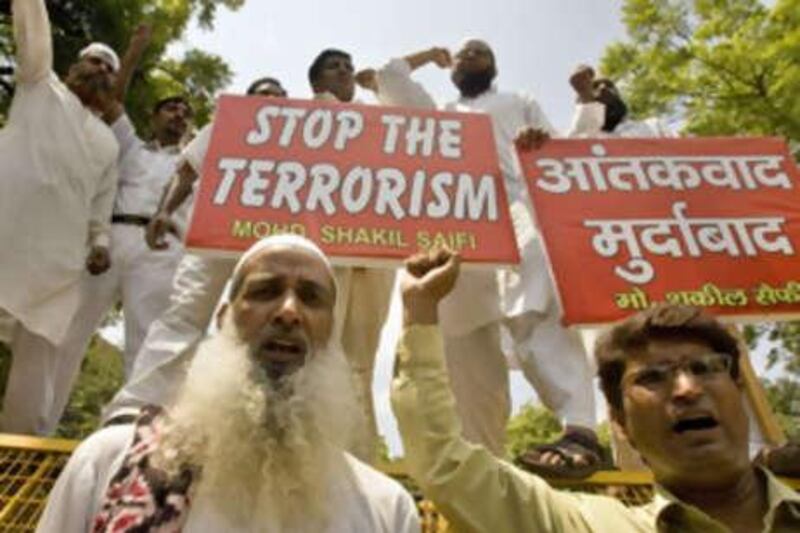NEW DELHI // "Be Alert. Be Vigilant. Be Watchful." The warning, part of a massive ad campaign by the New Delhi police, is splashed across newspapers and blares from radios throughout the capital, where a high security alert has been issued following a series of fatal explosions in other parts of the country.
After last week's bombings in Bangalore, the country's IT cradle, and Ahmedabad, the capital of Gujarat state where deadly sectarian riots killed more than 2,500 people in 2002, the capital is steeling itself for its own grim turn with terror. Potential threats to the capital prompted the deployment of more than 3,000 additional police constables this week. Plans are underway to stud the streets with cameras - adding to an already huge surge in surveillance. Metal detectors and bomb-sniffing dogs are increasingly common in public markets, and police are urging citizens to be extra vigilant.
"If they find or come across any suspicious article, they should report the same to police immediately," Rajan Bhagat, the police spokesman, told reporters this week. But for all the government's efforts, India remains uniquely vulnerable to terror, as it strives to maintain harmony among its Hindu and Muslim populations. There are roughly 150 million Muslims in India - the third largest population in the world, after Indonesia and Pakistan. Their numbers are, however, dwarfed by the 920 million Hindus that also call the country home. Since the bloody partition in 1947, when Muslims and Hindus rioted, relations between the two have been a delicate affair.
Now that a little-known pro-Islamic organisation called Indian Mujahideen has taken credit for the recent attacks - claiming they were to avenge the deaths of Muslims in the 2002 riots - the government finds itself in a precarious security position. "How exactly do you tackle terrorists, locate them and neutralise them without alienating the mass of Muslims in the area?" asks Bharat Karnad, a security analyst with the New Delhi-based Centre for Policy Research.
"The government is caught in a bind, really, because it has to be socially sensitive. Most of the terrorist elements are found being hosted by the Indian Muslim community or living in areas where Indian Muslims congregate. That's a problem the government has had for many, many years. "We haven't really devised a foolproof method." Instead of being proactive and working with Muslim communities to gather anti-insurgency information, authorities are simply heaping on extra helpings of security.
"These are what I might call cosmetic measures - something to assuage roused public opinion," Mr Karnad said. "It's something to suggest the government is doing something, anything. "Saying that you're putting more policemen on the street or putting up cameras and so on suggests the government is active and not sitting on its bottom." Indian cities are no strangers to terror. In 2005, Kashmiri separatists set off a blast in New Delhi that claimed 62 lives.
The following year, bombs ripped apart several trains during rush hour in Mumbai, killing 180 people. And last year, a bombing on a train bound for the Pakistani city of Lahore from New Delhi started a fire that claimed the lives of 68 people. Earlier this year, blasts rang out in the tourist city of Jaipur, killing another 63 people. In most of those attacks, fingers are inevitably pointed at the usual suspects - Pakistan's Inter-Services Intelligence agency, which critics say cannot be controlled by the country's civilian government, or insurgency groups, such as Harkat-ul Jehad-ul Islami, an Islamic group known for attacks in northern India.
Although the name may be new, the Indian Mujahideen is unlikely to be a new player, analysts said. "It's a cover group, obviously," said New Delhi's former police commissioner, Ved Marwah. "These organisations change their name frequently to escape international restrictions on their funding and various other things." A former governor of the turbulent northeastern states of Manipur, Mizoram and Jharkhand, Mr Marwah is well-versed in internal security and suggests the government cannot afford to be timid.
"There is no point in being nervous or on edge," he said. "They should take all the steps that need to be taken. They need to create an awareness among the people that this is a menace which needs to be dealt with through co-ordination with all the security agents, the people and the media." @Email:ccotroneo@thenational.ae





